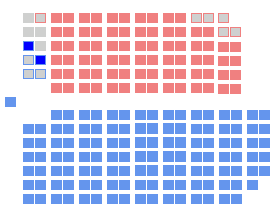February 22, 1887 | |||||||||||||||||||||||||||||||||||||
215 seats in the House of Commons 108 seats needed for a majority | |||||||||||||||||||||||||||||||||||||
|---|---|---|---|---|---|---|---|---|---|---|---|---|---|---|---|---|---|---|---|---|---|---|---|---|---|---|---|---|---|---|---|---|---|---|---|---|---|
| Turnout | 70.1% [1] ( | ||||||||||||||||||||||||||||||||||||
| |||||||||||||||||||||||||||||||||||||
 1887 Canadian electoral map | |||||||||||||||||||||||||||||||||||||
 The Canadian parliament after the 1887 election | |||||||||||||||||||||||||||||||||||||
| |||||||||||||||||||||||||||||||||||||
The 1887 Canadian federal election was held on February 22, 1887, to elect members of the House of Commons of Canada of the 6th Parliament of Canada.
Contents
- National results
- Results by province and in the North-West Territories
- See also
- Notes
- References
- Further reading
The Conservative Party of Prime Minister Sir John A. Macdonald retained power, defeating the Liberal Party of Edward Blake.


